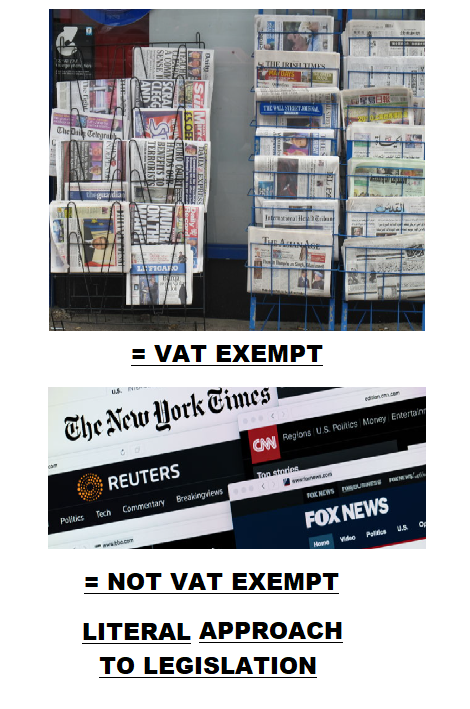News Corp UK & Ireland Ltd v Revenue and Customs [2023] UKSC 7 (22 February 2023)
Citation:News Corp UK & Ireland Ltd v Revenue and Customs [2023] UKSC 7 (22 February 2023)
Rule of thumb:If you have a content website making revenues above the VAT ceiling of £100k, do you need to pay VAT or is it exempt as providing news? No, it is not exempt, that only applies for paper copies of news. If content website are generating more than £100k then VAT has to be paid and it is treated the same way as all other businesses.
Background facts:This case was very simple factually but established a landmark point of law in transactional taxes. The basic facts of this case were that the News Corp website was generating revenues above the VAT threshold. They argued that they were exempt from VAT as they were a newspaper organisation, but HMRC dispute this and so the case ran to Court.
Parties argued:News Corp took a purposive interpretation of the VAT statute – they argued that print copies of newspapers are exempt from VAT, which was done with the purpose to promote & support media in UK society, and they were just doing the exact same content online that they did in their paper copy of their newspaper, so the website was exempt too. HMRC stated took a literal approach and stated that the statute did not exempt online news, only literal newspapers.
Court held:The Court upheld the arguments of HMRC, and affirmed that online news was not VAT exempt, rather only literal physical copies which were exempt. If the £100,000 VAT ceiling is exceeded, then the newspaper do have to pay VAT on the money generated thereafter on their website. In other words, the newspaper print copy has VAT exemption, but this does not apply to newspaper websites as they are not exempt from VAT.

Ratio-decidendi:
‘For all these reasons, we agree with the Court of Appeal that “newspapers” in Item 2 is not to be interpreted as including digital editions. The ordinary meaning of “newspapers” in context as at 31 January 1975 referred only to print newspapers; and a contrary view does not follow from an examination of the purpose of the relevant provisions. The always speaking principle has to be applied narrowly given the constraints of EU law. The relevant “genus of facts” should be viewed as covering only physical items involving the medium of print and no connectivity requirement. Digital editions do not fall within this categorisation’, Lord Hamblen at 60.
Warning: This is not professional legal advice. This is not professional legal education advice. Please obtain professional guidance before embarking on any legal course of action. This is just an interpretation of a Judgment by persons of legal insight & varying levels of legal specialism, experience & expertise. Please read the Judgment yourself and form your own interpretation of it with professional assistance.

